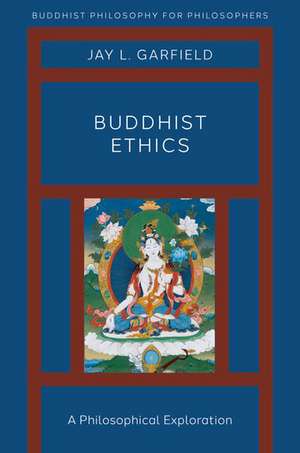Buddhist Ethics: A Philosophical Exploration: Buddhist Philosophy For Philosophers
Autor Jay L. Garfielden Limba Engleză Paperback – 2 feb 2022
| Toate formatele și edițiile | Preț | Express |
|---|---|---|
| Paperback (1) | 211.19 lei 3-5 săpt. | |
| Oxford University Press – 2 feb 2022 | 211.19 lei 3-5 săpt. | |
| Hardback (1) | 497.56 lei 31-37 zile | |
| Oxford University Press – 2 feb 2022 | 497.56 lei 31-37 zile |
Preț: 211.19 lei
Nou
Puncte Express: 317
Preț estimativ în valută:
40.42€ • 43.92$ • 33.98£
40.42€ • 43.92$ • 33.98£
Carte disponibilă
Livrare economică 31 martie-14 aprilie
Preluare comenzi: 021 569.72.76
Specificații
ISBN-13: 9780190907648
ISBN-10: 0190907649
Pagini: 248
Dimensiuni: 156 x 236 x 15 mm
Greutate: 0.35 kg
Editura: Oxford University Press
Colecția OUP USA
Seria Buddhist Philosophy For Philosophers
Locul publicării:New York, United States
ISBN-10: 0190907649
Pagini: 248
Dimensiuni: 156 x 236 x 15 mm
Greutate: 0.35 kg
Editura: Oxford University Press
Colecția OUP USA
Seria Buddhist Philosophy For Philosophers
Locul publicării:New York, United States
Recenzii
the book fills an important gap among presentations of Buddhist ethics. It presents Buddhist ethics as a live option, inviting readers to consider turning their attention away from the traditional questions of Western ethics and toward Buddhist questions.
As a teacher and student of Buddhist thought, I am tremendously grateful for this vivid introduction to the full edifice of Buddhist ethics. Garfield sets upright and tightens the bolts on the structure of Buddhist ethics, adds dimension with rich readings of Buddhist narrative and path literature, paints upon it a fascinating, pioneering interpretation of Buddhist vows, and opens the door for contemporary applications.
In this accessible, clear, and constructive engagement with Buddhist moral phenomenology, Jay Garfield continues his program to render contemporary philosophy's neglect of Asian thought rationally indefensible. Students and scholars alike will learn much from this book.
Garfield's book offers a bold statement of Buddhist ethics that eschews attempts to assimilate it to familiar Western ethical approaches like con-sequentialism and deontology. Instead, Garfield argues that Buddhism promotes a very different model of ethics focused on cultivating how we experience ourselves rather than on what outcomes we seek in the world. Garfield builds a clear and engaging case for this interpretation of Buddhist ethics as a kind of moral phenomenology. Buddhist Ethics demands that we rethink not just Buddhist philosophy, but the familiar assumptions about the very form moral philosophy might take.
Garfield's comprehensive presentation of Buddhist ethical thought is an invaluable contribution not only to philosophy, ethical theory, and theology but also a fascinating read for anyone wondering how to relate Buddhism to Western philosophy. Showing how Buddhist ethics aims for 'the trans-formation of our moral perception,' Garfield presents a compelling reading of Buddhism as a call for greater interconnectedness and universal moral responsibility.
This volume attempts to philosophically outline Buddhist ethics with occasional references to non-mainstream/alternative views from various (non-) Buddhist traditions and scholars.
As a teacher and student of Buddhist thought, I am tremendously grateful for this vivid introduction to the full edifice of Buddhist ethics. Garfield sets upright and tightens the bolts on the structure of Buddhist ethics, adds dimension with rich readings of Buddhist narrative and path literature, paints upon it a fascinating, pioneering interpretation of Buddhist vows, and opens the door for contemporary applications.
In this accessible, clear, and constructive engagement with Buddhist moral phenomenology, Jay Garfield continues his program to render contemporary philosophy's neglect of Asian thought rationally indefensible. Students and scholars alike will learn much from this book.
Garfield's book offers a bold statement of Buddhist ethics that eschews attempts to assimilate it to familiar Western ethical approaches like con-sequentialism and deontology. Instead, Garfield argues that Buddhism promotes a very different model of ethics focused on cultivating how we experience ourselves rather than on what outcomes we seek in the world. Garfield builds a clear and engaging case for this interpretation of Buddhist ethics as a kind of moral phenomenology. Buddhist Ethics demands that we rethink not just Buddhist philosophy, but the familiar assumptions about the very form moral philosophy might take.
Garfield's comprehensive presentation of Buddhist ethical thought is an invaluable contribution not only to philosophy, ethical theory, and theology but also a fascinating read for anyone wondering how to relate Buddhism to Western philosophy. Showing how Buddhist ethics aims for 'the trans-formation of our moral perception,' Garfield presents a compelling reading of Buddhism as a call for greater interconnectedness and universal moral responsibility.
This volume attempts to philosophically outline Buddhist ethics with occasional references to non-mainstream/alternative views from various (non-) Buddhist traditions and scholars.
Notă biografică
Jay L. Garfield is Doris Silbert Professor in the Humanities and Professor of Philosophy, Logic and Buddhist Studies, Chair of the Philosophy department, and director of the Logic program at Smith College. He is also Visiting Professor of Buddhist Philosophy at Harvard Divinity School, Professor of Philosophy at Melbourne University and Adjunct Professor of Philosophy at the Central University of Tibetan Studies. He has taught in Australia, Singapore, Japan and Germany and is a regular lecturer at major universities, Buddhist Studies centers and research institutions around the world. Professor Garfield is author, co-author, or editor of 30 books and over 180 articles and book reviews.


